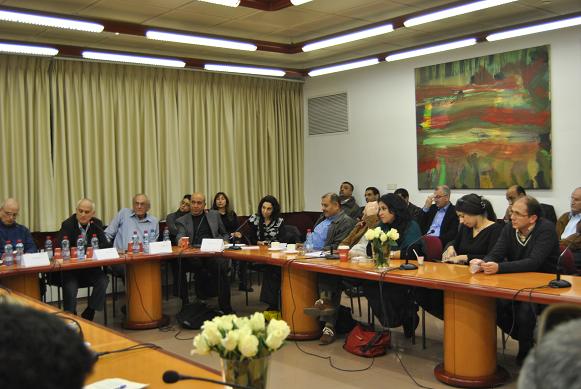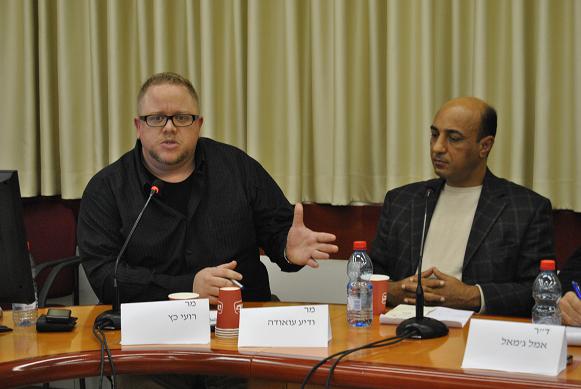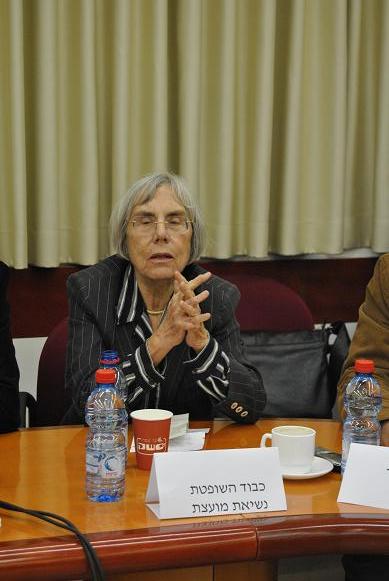I'lam, in coordination with Keshev, Agenda, and the Walter Lebach Institute, hosted a very thought provoking conference, "Public Broadcasting: Democracy and the Media" at Tel Aviv University on December 14 2010 to commemorate Human Rights Day (December 10). The conference brought together media scholars, regulatory practitioners, civil society actors, journalists and editors to discuss various aspects of public broadcasting in Israel, particularly the place of Palestinian citizens in it.
Among the conclusions and insights reached at this sitting of media professionals:
- Dalia Dorner, Retired Judge and President of the Israeli Press Council: I am committed to opening human rights reporting courses for Jewish journalists
- Professor Yaron Izrahi of the Political Science department at Hebrew University: The Israeli Broadcasting Authority is authoritarian and in it there exists no room for genuine participation of Arab citizens
- Professor Dov Shin'ar of the Media Department at Netanya Academic College: What confounds me most is the silence of citizens to developments in the Israeli Broadcasting Authority
- Wadee' 'Awawdy, Editor of 'Hadith al-Nas' Newspaper and Reporter for Al-Jazeera: The Israeli journalist is only considered 'professional' in the Hebrew media sphere so long as he operates within the confines of Zionism
- Ro'i Katz, Editor of online news portal 'Walla': I decry judges that with ease issue 'article banned from publication' orders
Professor Yaron Izrahi stressed in his talk that the silencing of minority voices that challenge the accepted Zionist discourse reflected authoritarian characteristics of the Israeli Broadcasting Authority (IBA). Public broadcasting is meant to put the citizen at the heart of the agenda whereas authoritarian broadcasting serves as a mouthpiece for the ruling authority. Prof. Izrahi asserted that although the IBA claims it is representing the voice of the majority, it is in fact representing the voice of 'extremists' and not the political majority.
Prof. Dov Shin'ar spoke of how the IBA was birthed as a political tool and since that moment of inception has continued performing the same function, critiquing the close ties of the IBA to politicians. He particularly expressed amazement at how citizens do not complain about paying for public service and in return being shortchanged in not receiving desired content.
Zuhear Bahloul, Deputy Director of Radio Al-Shams and lecturer at 'Emeq Israel' College spoke of the ghettoisation of Arabs in the IBA via the institution of an 'Arabic station', while no room has been made for Arabic programming on Israeli television.
Dr Amal Jamal, Director of I'lam, opened the second session by saying that discussion on democratic participation of Arabs in the Israeli media sphere needs to investigate primarily the nature of that sphere. Shaped by political forces that are in fact undemocratic, racist and inflammatory, the Israeli media has succumbed to this undemocratic agenda and to understand better the exclusion of Arabs from it, we must first understand its forms.
President of the Israeli Press Council (IPC), Dalia Dorner pointed to the urgency for legal provisions to be enacted in Israel encoding the right to 'freedom of expression' and other press freedoms such as the 'right to protect a source' given the present reality where 'leaks' as opposed to investigative journalism are the norm. Further, she underscored the importance of the media being critical of reality, functioning as the fourth estate that keeps arbitrary government action in check.
Dr Amit Schejter of Pennsylvania State University echoed the calls of Dorner and also raised alarm to the new 'Talkback Law' that will reveal the identities of commentators on websites if comments are deemed by a judge to be libelous. Dr Schejter spoke of how the law could impinge on the right to freedom of expression.
Arab journalist and editor Wadee' 'Awawdy critiqued the militarized Hebrew media agenda and the marginalization of journalists who attempt to give voice to Palestinian perspectives.
Katz, Editor of the Hebrew news portal 'Walla', decried the ease with which (in most cases) a single judge can deem an article or newspiece as not suitable for publication on security grounds and can do so at late, inaccessible hours hampering the newspapers' defence. Such practice hides various truths from the public with ease. Further, he criticized the various 'investigations' of Hebrew media journalists, which he opined are not meant to open criminal investigation files on them, but rather to build a culture of self-censorship.
See the conference schedule in Arabic/Hebrew here.
Download the press release in Arabic.
Photos from the event:

A section of the audience and panel at 'Public Broadcasting: Democracy and the Media' held at Tel Aviv University, commemorating Human Rights Day

Editor of 'Walla', Ro'i Katz (l) speaking and Wadee' 'Awawdy, editor of 'Hadith al-Nas' and Al-Jazeera reporter, listening in

Ret. Judge and IPC President, Dalia Dorner, delivering her address |